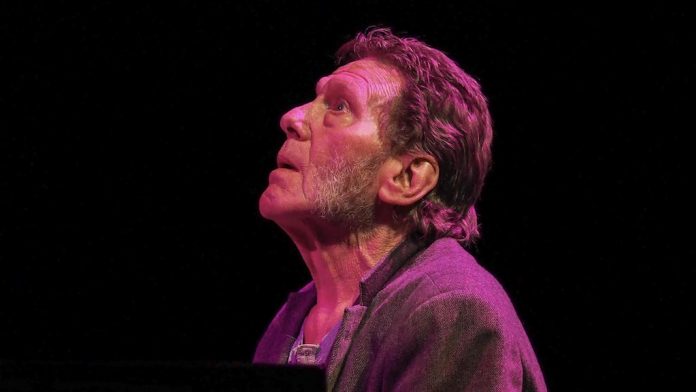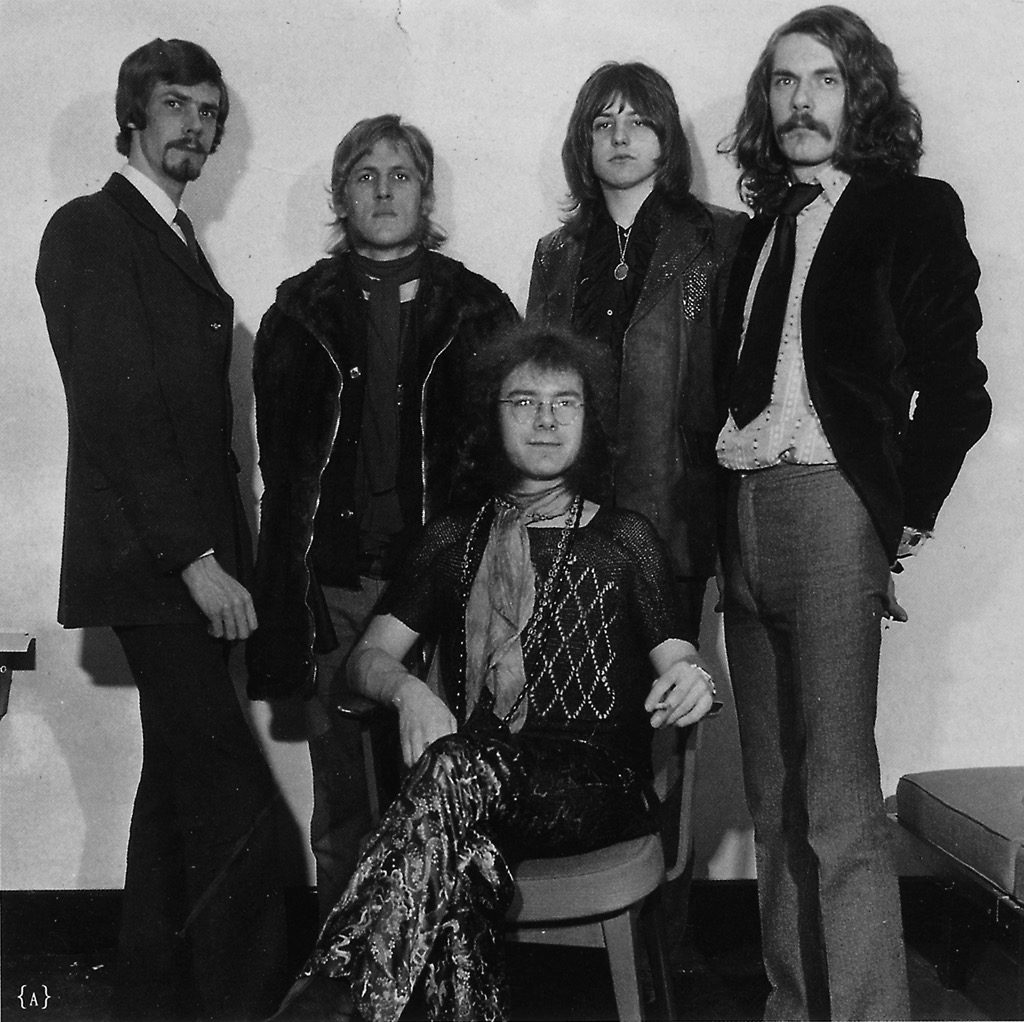
During the late 60s and early 70s British jazz enjoyed a mainstream popularity it has struggled to regain ever since. There was a sizeable audience for all manner of innovative music and there were music labels willing to provide it. Much of the credit should go to the musicians and if the cape and crown fit anyone perfectly it is Keith Tippett.
The son of an English father and Irish mother, Keith was born in 1947 in Southmead, a suburb and former hamlet of Bristol that became an overspill development following a post-war slum clearance programme. He attended Fonthill Road and Greenway Secondary Modern school and took advantage of every musical opportunity that came his way. From the age of five he studied classical piano and later the church organ while serving as a chorister with St. Thomas the Martyr church choir before becoming a member of both the school and Bristol Youth Brass Band.
On hearing Kenny Ball’s Midnight In Moscow he recognised his musical vocation by forming the KT Trad Lads when aged 14. His love of trad soon developed into a love of bebop and he later formed a modern jazz trio which promptly gained a residency at the Dug Out Club where he played with many of Bristol’s leading musicians.
In 1967, at the height of psychedelia, he moved to London seeking a career in music and like many aspiring jazzers began to hang around the 100 Club and Ronnie Scott’s on Frith Street. He soon assembled the Keith Tippett Sextet which included Mark Charig (cornet and flugel horn) Nick Evans (trombone) Elton Dean (alto sax), all of whom he had met at the jazz summer school in Barry.
The group soon came to the attention of Polydor for whom they recorded their debut album ‘you are here… I am there’ in 1968 after Tippett received an Arts Council grant. From the opening track, This Evening Was Like Last Year, the synergy of the group is self-evident as is Tippett’s willingness to allow his fellow creators space to express themselves. Tippett may have been as immersed in pop culture as in Bill Evans and Cecil Taylor – he quotes the Beatles’ Hey Jude on Thank You For The Smile – but he ably demonstrates his own magic formula and innovative temperament throughout.
An argument between the album’s producer Giorgio Gomelsky and Polydor over expenses meant the release of the album was delayed for a year, and while it then received positive reviews it was no longer representative of the group’s ambitions.
The rock cognoscenti meanwhile pricked up their ears and Tippett soon found himself in demand as a session musician. Besides working with folkie Shelagh McDonald on her exquisite debut album, he also made formidable contributions to three albums by progressive rock pioneers, King Crimson; an appearance on Top Of The Pops (the TOTP group pictured below – L-R, Peter Giles, Keith Tippett, Robert Fripp, Greg Lake, Michael Giles) to promote their single Catfood prominently featured the pianist’s coruscating keyboard runs.

King Crimson bassist Peter Giles said “Keith Tippett occupies a unique place in British musical history, effortlessly spanning, inter alia, Prog Rock, Jazz and Free Form music genres. He is a musician’s musician – there is no higher accolade than that”.
Tippett also guested on Julie Driscoll’s first solo album, entitled 1969 (not released until 1971, again thanks to Polydor dragging their heels). It features eight self-penned compositions on which she is accompanied by a stellar line-up. As a consummate interpreter of other peoples songs, Driscoll had already enjoyed success with the Brian Auger Trinity when they reached the Top 10 with their distinctive cover of Dylan’s This Wheel’s On Fire. It was during the sessions for 1969 that Keith and Julie, united in their passion for music, fell in love and married the following year.
If their recording career had started off on the wrong note, as a live act the Keith Tippett Group were making all the right noises and soon attracted the attention of newly launched Vertigo Records – an offshoot of Philips/Phonogram – which sought to promote music-makers working outside the commercial restraints of the mainstream.
Tippett’s second album, named after a geophysical ditty by Soft Machine, Dedicated To You, But You Weren’t Listening, was released in 1971 to universal acclaim. Housed within the striking Brainchild cover design by Roger Dean are eight tracks which serve to showcase the intuitive brilliance of the whole group – from the opening bossa-nova lilt of This Is What Happens to the atonal stabbings of Dean’s Gridal Suite, to the Zapparesque riffing of Nick Evans’ closing number, Black Horse.
The early 70s proved a fortuitous time for British jazz and Tippett now found himself amid a standing army of contemporary jazz musicians who were reaping the benefits of exposure to a wider public, among them Mike Westbrook, Just Us, Ian Carr’s Nucleus, John Surman, Chris McGregor’s Brotherhood of Breath and the Bebop Preservation Society, to name but a few.
Brian Godding: ‘In its short lifespan Centipede performed some of the most creative “happenings” I’ve experienced as a musician’
With his neck or nothing approach, in December 1970 Tippett decided to put together a 50-piece ensemble called Centipede, comprising musicians from a broad range of genres. Guitarist Brian Godding recalls:
“Centipede: fifty musicians – one hundred feet. Musicians from totally diverse backgrounds all contributing to a musical extravaganza conceived and constructed by Keith, amazing! My personal memories are of a big adventure unravelling as this ‘tribe’ of people came to grips with the concept of structure and improvisation intertwining seamlessly. In its short lifespan Centipede performed some of the most creative ‘happenings’ I’ve experienced as a musician”.
In part due to logistics, they performed but a handful of concerts over the next few months across the UK and Europe before recording the double album Septober Energy the following summer. Released on RCA’s short-lived Neon label, the album received less than favourable reviews – which may have helped hasten the band’s demise soon after. Even if the intro and outro are overlong, the collective playing within has lost none of its impetus and Dean contributes some of the most lyrical passages on saxello, though we hear all too little of Tippett.
Cloth-eared critics aside, Tippett had already settled upon the idea of a more intimate combo featuring Roy Babbington (bass) Frank Perry and Keith Bailey (drums and percussion) and Julie (vocals, guitar and mandolin) with whom he recorded Blueprint (1972) for RCA. All six tracks on the album are improvised, for once allowing us to hear Tippett’s ruminative explorations while Julie offers enough telling substance to make her presence felt.
The acoustic combo evolved into Ovary Lodge (minus Julie) and recorded their self-titled album the following year. The album consists of six improvised acoustic pieces, and while Eastern and Indian influences abound several numbers are too abstract and undisciplined to warrant the listener’s attention and there are many similar moments when Mrs T’s presence is sorely missed.
Not long after the release of Ovary Lodge, Tippett made a conscious decision to avoid working with major labels and allow himself the freedom to make music under his own terms. In the ensuing years he has undertaken an expansive and often ambitious recording career. During the 70s he recorded two live albums with Stan Tracey – TNT and Supernova – and played a significant role in reigniting the career of the elder statesman of British jazz who had fallen on hard times. Tippett regularly guested with Elton Dean’s Ninesense, both live and in the studio on albums such as Happy Daze and Oh! For The Edge, and often in side projects augmented by the addition of Hugh Hopper (bass) and Joe Gallivan (drums) with whom he recorded Cruel But Fair, among others.
Tippett also formed Ark, a 21-piece orchestra with which he recorded Frames: Music For An Imaginary Film. With Julie he produced three Couple In Spirit albums, alongside a number of spontaneous works with his Mujician quartet featuring Paul Dunmall (reeds), Paul Rogers (bass) and Tony Levin (drums). And while it might be foolhardy to cherry-pick individual albums, it would be negligent not to mention 66 Shades Of Lipstick (1990) – his brooding collaboration with saxophonist Andy Sheppard, Mujician III (August Air) (1989) and The Dartington Concert (1992), dedicated to the late South African saxophonist, Dudu Pukwana. The latter two, solo performances recorded live, reveal as much about the integral honesty and individuality of the man as his music.
Michael Giles: ‘Keith is not only a brilliant piano player but also an exceptional listener to the sounds and music around him’
In 2011 he guested on In The Moment, a second album of improvised works by the Michael Giles MAD Band. Giles says “It was an exciting adventure into the unknown universe of music, sound and silence, without any expectations. Keith is not only a brilliant piano player but also an exceptional listener to the sounds and music around him. At times he would creep into the Mad band chaos and at other times he would take the lead and move the music in a different direction.
“Towards the end of the sessions Keith unexpectedly abandoned the pristine grand piano in favour of playing an out-of-tune, unloved piano in the dark dank shadows at the back of the studio. This is where Keith’s sense of humour combines with mine and we have some uproarious fun with piano and drums. He makes that pitiful old piano sound magnificent – as if there were 30 fingers hammering on the keyboard. He also does something similar on the low end of the grand piano on the first track, Grand Graffiti.
“On other tracks he’s leaning over the keyboard, getting his head under the lid and delicately playing the strings with his fingers amongst a carefully placed variety of found objects, all of which produce mysterious sounds and textures”.
His most recent recording with the Keith Tippett Octet, The Nine Dances Of Patrick O’Gonogon (2016), embodies outstanding examples of his preconceived pieces combined with improvised passages and conveys a heartfelt spirit of joyfulness influenced in part by his mother’s Irish ancestry. This is an album of jazzy jigs and reels and celebratory sounds and playfulness, so befitting of music that suggests it could be the lost soundtrack to Spike Milligan’s novel Puckoon.
Keith Tippett has often said “May music never become just another way of making money”. It remains an article of faith to which he has steadfastly held throughout his career.















